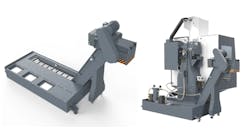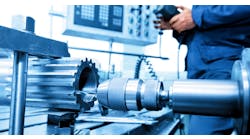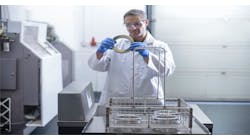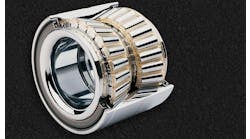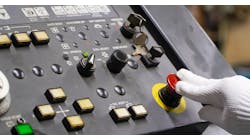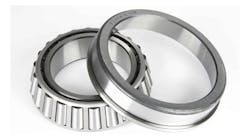The “cutting edge” of parts machining goes far beyond having the latest CNC machines and accessories. It also means engaging with customers at the earliest stages of the production process using the latest in Design for Manufacturing methods (DFM), simulation, and process verification tools prior to cutting the first part. Then, it is critically important to have flexible and adaptable process technologies to make changes and scale production when needed, with the ability and commitment to inspect with the most precise tools throughout the process.
The goal of this approach is to give customers the assurance – when the machining begins – that the parts are going to be 100% right, with zero defects, the first time and every time.
Delivering this peace of mind is critical. After all, there is so much at stake when machined parts are critical to performance and safety, and the reliability of how parts function is essential to success.
Typically, when a prospective customer is looking for a machine shop to make a complex part, it is looking for the latest equipment and current certifications, including ASQ, ISO 9001 and AS9100. There is a tremendous benefit, however, for a customer to look beyond these prerequisites for a machine shop that will work with them from the design phases through manufacturing, to predict and resolve failures before they happen. The ability to predict when failures could occur requires proactive communication and early engagement with an expert machine shop.
Ability to adapt early
A Design for Manufacturing process enables the machine shop to anticipate possible complications and limitations in the machining process upfront.
“With Design for Manufacturing, the goal is to make the product manufacturable in an efficient and cost-effective way and that starts with reviewing the parts and discussing the specifications openly,” said Tony Doan, CEO of San Jose, Calif., Halcyon Manufacturing, an advanced ITAR-registered and AS9100/ISO9001-certified manufacturing shop for complex parts serving Greater Silicon Valley.
“Manufacturers need a cutting-edge machine shop that has both the expertise and the desire to guide their customers on how to achieve better machined products at a better price,” he added.
This analysis and feedback are part of an ongoing manufacturing collaboration between a client and its contract machining partner well before production starts, from the project’s inception through prototyping.
Halcyon applies the Design for Manufacturing protocol across a wide spectrum of metal machining, from bar grade 6061 aluminum to brass, copper, titanium, stainless steel, and plastics. The company also works with quartz, ceramic, graphite, titanium, and a variety of steels and serves customers in general manufacturing, metalworking, aerospace, defense, automotive, medical, and semi-conductor sectors.
“When you can use the latest simulation and process verification technologies prior to cutting the first chip of metal or plastic, then when you start manufacturing, you know that the parts are going to be 100% right the first time, every time,” Doan said.
Rapid prototyping
Rapid prototyping removes financial and time risks by providing a cost-effective way to test a full range of designs and materials. By applying rapid prototyping, many iterations of a part may never make it to production, which can save time and money for a manufacturer.
“If we understand how the part needs to function, we can 3D-print the item in plastic, run it through a few tests, and then proceed – rather than rush to machine parts out of an expensive material in the prototype phase,” Doan explained, adding that in addition to initial prototyping, 3D-printing can be used to create workholding and fixtures.
Adaptability and scalability in production
Manufacturing and metalworking customers often operate in highly dynamic markets and the need for changes to part specifications and the quantity of parts is high. Cutting-edge, aerospace machine shops must therefore be adaptable and flexible for any design changes. They also must be capable of scaling production up to “lights out” manufacturing if needed, without compromising the accuracy of the machining.
“While capacity is certainly important, the overall size of a machine shop is not the most important criterion,” Doan said. “Manufacturers certainly need scale, but also require adaptability as complex manufacturing designs evolve and change. For a machine shop to be an effective partner, they need to be nimble.”
Inspecting quality upfront
Finally, to complement the machining capabilities and nimbleness, a shop must have state-of-the art metrology equipment for advanced inspections, guided by a proactive zero-defect mindset.
“It’s not about making parts and sorting out the bad ones and shipping the good ones,” according to Doan. “You need a machine shop committed to not making the bad parts at all.”
“To produce the most precise parts, you must be able to inspect more than the finished goods,” he added. “A machine shop should be inspecting in real-time such things as the set-ups and the speed throughout the process, which enables data to be captured for statistical predictive process control.”
At Halcyon, automated coordinate measuring machines (CMMs) perform process inspections and produce first article reports. Halcyon also uses a digital multimeter (DMM) with scanning capability that can take thousands of data points during a scan of a complex curved surface. This results in very precise, and accurate, repeatable product evaluations.
Forging a partnership
Manufacturers and metalworkers that rely on machine shops to produce precision parts to extremely tight tolerances with consistency should look beyond the basic certifications and CNC capabilities for those with the expertise to optimize the manufacturing process before any items are manufactured, and to adjust as needed afterward. With this level of flexibility, and by ensuring a zero-defect approach at every stage of the process, OEMs and manufacturers of every type and tier can proceed with certainty that the parts they are receiving are of the highest reliability and without unnecessary additional costs for their most critical applications.
Del Williams is a technical writer in Torrance, Calif. He writes about health, business, technology, and educational issues, and he holds an M.A. in English from C.S.U. Dominguez Hills.